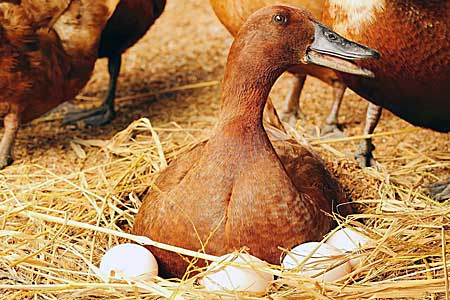
How many eggs your ducks lay, and for how many years, depends on several factors. Most of these factors are easily within your control as the ducks’ keeper. Here are six considerations that influence how to keep your ducks laying well.
Breed and Strain
Some duck breeds, or strains within a breed, lay better than others. So the first consideration is to obtain a type of duck that is bred for egg production. Some strains that have been developed specifically for egg production lay better than the best chicken layer strain, according to Dave Holderread in his book Storey’s Guide to Raising Ducks.
Age
A lightweight layer breed should begin laying by the age of six months. Heavier breeds may not lay until their seventh month. The best layers will continue producing eggs for about 10 months of the year. Most strains developed for egg production lay well for at least their first three years, although some continue laying well for five years or more.
Diet
As young ducks approach laying age, their nutritional requirements increase. About three weeks before you expect them to start laying, gradually switch their diet to a 16% to 20% layer ration. If your local farm store doesn’t carry duck layer feed, a good quality layer ration formulated for chickens also works well.
For sound thick shells, provide calcium continuously throughout the laying season. Ducks that have access to forage usually get plenty of calcium from the shells of bugs and snails they snack on. Still, it’s a good idea to furnish a free-choice hopper of either ground oyster shell or limestone, but not dolomitic limestone, which can inhibit egg production.
Besides providing a source of calcium, another advantage to foraging is that ducks can obtain up to 25% of their total dietary needs through forage. And, since feed is the major ongoing cost of keeping ducks, a 25% reduction in purchased feed adds up to big savings without having an effect on laying.
Temperature
Temperature determines how much feed and water ducks consume. In cold weather, ducks eat more than in warm weather. Insufficient feed can lead to lower egg production. Insufficient water, because the water froze and became unavailable, can likewise affect laying.
In warm weather, ducks tend to eat less, so their dietary protein needs to be increased. While they eat less in warm weather, they drink more. If their water runs out before the drinker is refilled, egg production will go down. If the water is too warm, ducks will be discouraged from drinking, with the same result as water deprivation. Keep drinkers in the shade, fill them with cool water, and in extremely hot weather add ice to the water so it stays cool longer.
Lighting
To lay well, ducks needs at least 14 hours of light each day. So, to keep them laying during the shorter days of late fall, winter, and early spring use lightbulbs to augment natural daylight. Inside a shelter use one 40-watt bulb per 150 square feet; outdoors use one 100-watt bulb per 400 square feet. In either case, add an inexpensive reflector from the hardware store, and hang the bulb about six feet off the ground to minimize shadows.
Adjust your lighting times as needed to maintain 14 hours or more of light per day; even a minor reduction in light hours can throw off laying. A timer is helpful for maintaining adequate light hours. To avoid the risk of young ducks starting to lay too early in life, begin your lighting program only after your ducks reach 20 weeks of age. Premature laying will cause a duck to be less productive than it would be otherwise.
Management
Excess stress can cause a decrease in laying. Stress conditions include overcrowding, any abrupt change in diet, contaminated or off-flavor water, an unclean shelter, and recurring situations that tend to spook or agitate the ducks. Frequent mating is another stressor. “Unless eggs are going to be used for hatching, there is no need to have drakes,” advises Holderread. “Hens lay better without frequent mating activity.”
Health issues are other stressors that reduce egg production. Fortunately, ducks are fairly resistant to disease, as well as to internal and external parasites. Along with minimizing potential health problems, following the procedures outlined above will ensure that your ducks keep laying well.
And that’s today’s news from the Cackle Coop.
Gail Damerow is editor and principal author of Backyard Homestead Guide to Raising Farm Animals, which includes a chapter on raising waterfowl.

